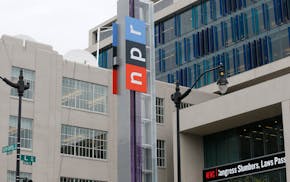Minnesota's JOBZ program has given more than 300 companies sweeping tax breaks in hopes of creating jobs where the state needs them most.
But as state government becomes strapped for revenue and Minnesota's job growth has fallen behind the national rate, the public has no way of knowing details on the costs of what JOBZ has achieved.
Unlike most government subsidies, the tax breaks given to companies through JOBZ are confidential. That's because state law routinely makes tax returns private, and Gov. Tim Pawlenty and legislators chose not to require disclosure as a condition of JOBZ's breaks when they enacted the program four years ago.
As Pawlenty seeks this winter to expand the program, not even the legislators who would vote on his proposal can find out the size of tax breaks each company receives.
The confidentiality draws criticism from business owners who fear unfair competition and also from economists and others.
"Bad things happen when governments give away things and keep it secret," said David Dillon, who wants to know if his Brooklyn Park printing business faces competition from firms subsidized with breaks through JOBZ.
In Iowa, companies that apply for similar deals must sign a release agreeing to waive privacy. In New York, courts ordered disclosure of comparable breaks following news media lawsuits.
Pawlenty spokesman Brian McClung said the governor is willing to hear concerns and consider changes. But McClung defended the current system of confidentiality, saying publicizing the tax breaks "may raise privacy concerns or create a chilling effect for the intended goals" by discouraging some firms from participating in the program.
Only summary data disclosed
Under the program, businesses that create jobs in special zones outside the seven-county metro area can receive exemptions from most state and local taxes. Pawlenty, who created JOBZ, wants to extend the breaks beyond the 2015 expiration date. The proposal comes as the state faces a $373 million projected deficit and as the legislative auditor examines the cost and public benefit of the tax breaks.
Legislative Auditor Jim Nobles said his office has access to the individual tax information that is withheld from the public. That data is critical, Nobles said, to assessing the program's effectiveness. His report, which is expected in February, will not identify the firms associated with individual data.
The state now releases only summary data on JOBZ tax breaks. Reports indicate that in 2004 and 2005, participating businesses received $18.7 million in state tax breaks. The program reports creating 3,669 jobs over those two years.
"Aggregate data are meaningless," said Greg LeRoy, executive director of Washington, D.C.-based Good Jobs First, a public subsidy watchdog group. "You can't do cost-benefit analysis without knowing how much an individual company got and compare what they did with the money."
But some tax-break beneficiaries aren't enthusiastic about the idea. Hubert Fixsen, vice president of Bushmills Ethanol in Atwater, said the tax breaks could be taken out of context by the public. "There's still a certain segment of the population that could view that and say, 'this person, this group is getting an unfair advantage,' without really knowing the full extent of it," he said.
A lack of transparency in subsidy programs raises suspicions of sweetheart deals between politicians and local business owners or other types of unfairness, said Bill Buzenberg, executive director of Public Integrity, a group that monitors government spending.
"This may be perfectly legit in every way," he said of JOBZ transactions. "But the only way to find out and to know is to let the sun shine in."
After the Syracuse Post-Standard sued to force disclosure in New York, the paper found many companies had claimed public money for creating "new" jobs by merely reorganizing under a new name.
No debate on disclosure
The Minnesota Legislature could have exempted JOBZ from tax confidentiality laws, according to Don Gemberling, an attorney who oversaw Minnesota public records for decades. He adds that concerns about the privacy of JOBZ recipients are misplaced.
"If you are getting a public benefit, then part of the tradeoff is more information about your company ought to be made public," he said.
But Joel Michael, a House research analyst who worked on the JOBZ legislation, said Pawlenty and legislators never seriously considered making the breaks public, avoiding the kind of debate that occurred in other states.
One reason it didn't happen in Minnesota is that the program won strong bipartisan support that stifled criticism, said one veteran legislator.
"There's not going to be partisan sniping because, 'Our guys are in on the deal, too,'" said Sen. John Marty, DFL-Roseville. "It's just a political decision that, 'We're going to have too many people looking over our shoulder criticizing the subsidy if they see how big it is.'"
JOBZ sponsor Sen. Tom Bakk, DFL-Cook, has turned critic, arguing that the Legislature lacks adequate information on the program's impact. Still, he says, the Senate needs to consider "privacy issues" in any discussion about requiring firms to publicly disclose their breaks. "I think it's something that certainly should get some public debate," he said.
Dillon, head of Meyers Printing in Brooklyn Park, has joined other business owners not participating in JOBZ who have sued to challenge the program's constitutionality.
Dillon would like to know how many of his rivals are getting JOBZ tax breaks and how much. "There's some dollar amount [of subsidy going to competitors] at which I'm not competitive," Dillon said. "I need to consider moving or some other plan."
Mike Meyers • 612-673-1746 Pat Doyle • 651-222-1210
Poland's president becomes the latest leader to visit Donald Trump as allies eye a possible return
Sweeping gun legislation awaits final votes as Maine lawmakers near adjournment
